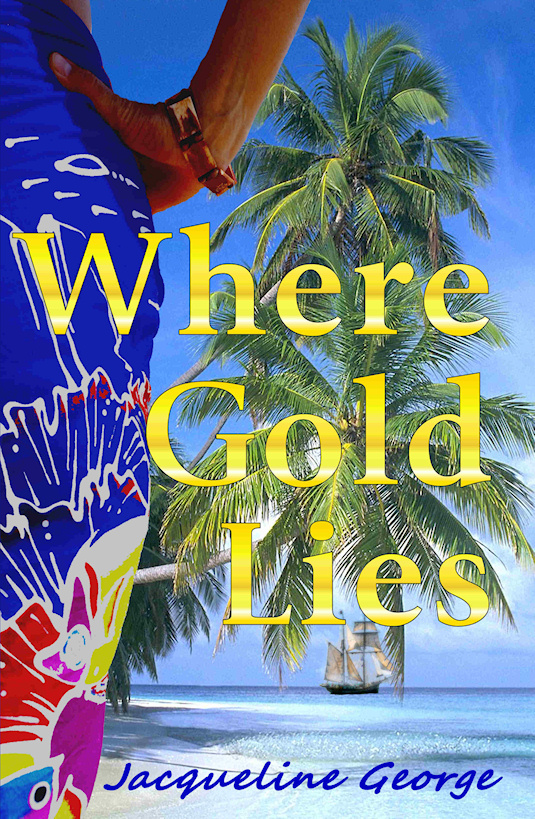




After Captain Flint dies in Savannah from the effects of yellow fever and too much rum, young Dick Brown and his pirate shipmates set out to find Flint's hidden treasure. Their quest leads them first to England and then back to the Caribbean, searching for the vital chart that will lead them to the spot.
There, on the island where Flint buried untold wealth in gold and jewels, Long John Silver, Dick Brown and the pirate crew struggle to win control of the chart. They finally succeed, but will their victory bring them the riches they dream of? Or will Dick find that there is more to life than gold, and that true love has a value far beyond sparkling jewels?
There, on the island where Flint buried untold wealth in gold and jewels, Long John Silver, Dick Brown and the pirate crew struggle to win control of the chart. They finally succeed, but will their victory bring them the riches they dream of? Or will Dick find that there is more to life than gold, and that true love has a value far beyond sparkling jewels?

Once, a long time ago when I was too young to read for myself, I recall my mother reading to me at bedtime. She had chosen everyone's favourite Treasure Island. It is a very vivid memory because she had got as far as the night the pirates attacked The Admiral Benbow inn, and Jim Hawkins and his mother were cowering in ditch, fearing for their lives.

A Pirate's
Dream
Dream
I was absolutely terrified, and would not let my mother read any more. Still, something must have stayed and bubbled away in the back of my mind, because I eventually sat down to write another version of that great tale.
My story is, perhaps, a little more grown-up but I have shamelessly borrowed the original characters. I won't say I have improved them - that would be arrogant indeed - but maybe I have seen them through adult eyes.
I suppose I should feel a bit of a fraud, relying so heavily on the invention of another writer. I don't, and I hope Robert Louis Stevenson, in his final calm
My story is, perhaps, a little more grown-up but I have shamelessly borrowed the original characters. I won't say I have improved them - that would be arrogant indeed - but maybe I have seen them through adult eyes.
I suppose I should feel a bit of a fraud, relying so heavily on the invention of another writer. I don't, and I hope Robert Louis Stevenson, in his final calm
resting place overlooking the ocean at Samoa, will take my attempt as a compliment.
The story takes place in two settings that I know and love, the West Country of England and a heart-breakingly beautiful tropical island, complete with white coral
The story takes place in two settings that I know and love, the West Country of England and a heart-breakingly beautiful tropical island, complete with white coral
Robert Louis Stevenson's tomb in Samoa, overlooking the South Pacific
sands and leaning palm trees. I was brought up in the first, and am now a permanent fixture on the shores of the Coral Sea. Writing an adventure story set in places like that was no hardship at all!
Although all our favourite characters are there, Jim Hawkins, Dr Livesey, Squire Trelawney, one man dominates them all. Long John Silver stumps through the story on one leg and a crutch, and has stumped right out of the book to become one of our literary icons. Everyone knows about Long John, but it seemed to me that there was a great deal more that might be said about him. Adult emotions do not have much place in the original children's book, but I was free to show much more of him.
Although all our favourite characters are there, Jim Hawkins, Dr Livesey, Squire Trelawney, one man dominates them all. Long John Silver stumps through the story on one leg and a crutch, and has stumped right out of the book to become one of our literary icons. Everyone knows about Long John, but it seemed to me that there was a great deal more that might be said about him. Adult emotions do not have much place in the original children's book, but I was free to show much more of him.
Filling out Long John's character was great fun and, of course, I fell in love with him. I suspect Stevenson did too.

Heartbreakingly
Beautiful Islands
Beautiful Islands
Initially, I was afraid that basing my story on such a well-known text would be tying my own hands, limiting me to repeating almost parrot fashion what we have all read. Instead I found that the characters had a life of their own and were quite capable of speaking for themselves.
Any author will tell you that when a character writes his (or her) own story, life is not only much easier for the author but the resulting story is more authentic and absorbing for the reader. I hope you find that too.
Any author will tell you that when a character writes his (or her) own story, life is not only much easier for the author but the resulting story is more authentic and absorbing for the reader. I hope you find that too.
Readers' Reviews
Maura - Reviewer for Coffee Time Romance & More
The Author is a descendant of Dick Brown, one of the infamous Captain Flint’s crew. She is very curious about the man she knew as a respected minister.
Dick Brown led a very adventurous life before finding respectability as a clergyman. He wants his daughter to know how he became Richard Brown and a bit about her own family.
A young pirate has the adventure of his life searching for Captain Flint’s treasure. This is a retelling of Treasure Island through the recollections of a much older and wiser Dick Brown with the additional story of what happened to him after.
I really enjoyed this adventure tale. I was a bit skeptical at first believing that no one could add to or improve on Treasure Island, but I was mistaken. The author does a great job of telling the story from another angle and continuing on after the original story ends. I have always enjoyed family stories and this reads just like one as it is written from a father to his daughter. It just seems so much more personal written in this style. The plot and the characters are very well done and this one will be difficult for you to put down.
Snapdragon
Reviewer for Long & Short Romance Reviews
Jacqueline George’s pirate tale, Where the Gold Lies, is well worth reading. Although it is far from a typical romance – and further from what you expect to discover between the pages of a ‘historical romance,’ quality of characters make this work shine. It is largely a retrospective of the life of one man, Dick Brown, and is presented as thru a descendent of his. This initial setup is cleverly contrived, and offered almost conversationally – so delightfully first person that indeed you feel are having this revealing chat with a friend.
The sounds and smells of the sea, the loss of men and friends and any sense of attachment to man or principle pervade this work. The men – From Long John Silver to Billy Bones, have names that offer the sound and sense of the times. They weigh anchor and dream of the nearest taverns, wait to ambush ships full-laden from Charleston. Our narrator shares views of the people they see – especially the women of the West Indies. Yet, to our young narrator- none can compare to the beautiful Isabel. We see her importance early on – but are swept back into the story – the ‘his’-tory, of this young man’s days in England, his time at sea, and the pursuit of treasure which would make many men famous. Unexpected and unpredictable turns crop up, just when you think you can predict how it will all turn out.
This is beautifully written, and cleverly put together. I selected 4 books for it here, as I can only just call it a romance – a pirate’s tale would be more accurate. Yet, Romance does drive some events, and I don’t believe a romance fan would be dismayed to read this…
Maura - Reviewer for Coffee Time Romance & More
The Author is a descendant of Dick Brown, one of the infamous Captain Flint’s crew. She is very curious about the man she knew as a respected minister.
Dick Brown led a very adventurous life before finding respectability as a clergyman. He wants his daughter to know how he became Richard Brown and a bit about her own family.
A young pirate has the adventure of his life searching for Captain Flint’s treasure. This is a retelling of Treasure Island through the recollections of a much older and wiser Dick Brown with the additional story of what happened to him after.
I really enjoyed this adventure tale. I was a bit skeptical at first believing that no one could add to or improve on Treasure Island, but I was mistaken. The author does a great job of telling the story from another angle and continuing on after the original story ends. I have always enjoyed family stories and this reads just like one as it is written from a father to his daughter. It just seems so much more personal written in this style. The plot and the characters are very well done and this one will be difficult for you to put down.
Snapdragon
Reviewer for Long & Short Romance Reviews
Jacqueline George’s pirate tale, Where the Gold Lies, is well worth reading. Although it is far from a typical romance – and further from what you expect to discover between the pages of a ‘historical romance,’ quality of characters make this work shine. It is largely a retrospective of the life of one man, Dick Brown, and is presented as thru a descendent of his. This initial setup is cleverly contrived, and offered almost conversationally – so delightfully first person that indeed you feel are having this revealing chat with a friend.
The sounds and smells of the sea, the loss of men and friends and any sense of attachment to man or principle pervade this work. The men – From Long John Silver to Billy Bones, have names that offer the sound and sense of the times. They weigh anchor and dream of the nearest taverns, wait to ambush ships full-laden from Charleston. Our narrator shares views of the people they see – especially the women of the West Indies. Yet, to our young narrator- none can compare to the beautiful Isabel. We see her importance early on – but are swept back into the story – the ‘his’-tory, of this young man’s days in England, his time at sea, and the pursuit of treasure which would make many men famous. Unexpected and unpredictable turns crop up, just when you think you can predict how it will all turn out.
This is beautifully written, and cleverly put together. I selected 4 books for it here, as I can only just call it a romance – a pirate’s tale would be more accurate. Yet, Romance does drive some events, and I don’t believe a romance fan would be dismayed to read this…
Billy Bones and the Treasure Map
Long John had sent a message or, more exactly, a simple threat. If Billy parted with the chart peacefully, he might rest undisturbed in his retreat. If he tried to keep it, we would take it from his dead body.
Long John had written me a kind letter that started with compliments and went on to repeat Pew’s orders. If Billy tried to run again, we were to catch him in the open and take the map from him by force. If he stayed at the inn, we were to lie up and wait for Long John. The letter was quite clear; lie up somewhere near the inn, close enough for word of our presence to get to Billy. A few days of waiting for us to strike might scare him into volunteering the map.
By the time Pew and I arrived on the deep road running towards the village, Black Dog had already met Billy. He was waiting for us beside the road, looking pale and angry. For a little time all we could only get oaths and imprecations from him, but eventually the tale of the meeting emerged much as Livesey has told it. Billy and Black Dog sat down to drink together, and Black Dog questioned Billy about the chart. At first he denied any knowledge of it and would talk only of his old ship-mates and his voyages with Flint. Then, dreaming aloud, he talked of fitting out a fishing boat or a coaster and going back to search for Flint’s treasure. In his wandering, he let slip that he knew the latitude and longitude of the island, and realised he had given himself away. Straight away, he lost his temper and attacked Black Dog.
“Chased me right out of the inn, he did,” complained Black Dog. “Near split me in two with his cutlass, and me not able to stand and spit him, or we’d have lost the chart for good.”
Black Dog led us up the side of the valley to where Caspar was watching the inn. Here, with our backs to an old thorn, we could peep over the dead bracken and brambles at the Admiral Benbow and the village. A pretty place in summer, no doubt, but in January the dead grass on the bank was wet and there was mud underfoot. The thorn gave no shelter from the west wind with its driving rain. We grew heartily sick of the view from that hill-side over the following wintry days.
We set up camp in a steep coppice a short way up the valley from the village. We had company. A couple of gypsy families were also camped there. Pew sent Caspar back to Bude for a tarpaulin next day, and we lay on the brush wood the gypsies gave us.
They led a bleak existence in winter. A local farmer had rented the coppice to them, and they were engaged in making thatching spars and clothes pegs. Not every day, of course. There is hardly a market for spars at that time of year. When the weather was too bad, they just sat crowded in one of the tents, talking and telling stories. They spoke their own language amongst themselves, but when we visited they swapped stories with us in English.
I own to sharing the popular prejudices against gypsies. Chickens and worse are stolen where they pass by. They are a dirty lot, living close to the ground, and it is true that the men in particular will go a long way to avoid doing a hard day’s work. But set against that, they are wonderfully good company with a fund of talk and sayings that lodge in your memory for years. I cannot say that we stole any babies. Nor did we eat any hedgehogs (there being none around in winter.) We did dine several times on hare and pheasant that were not legally purchased, and I will not deny there were stolen turnips along with them.
The young children, boys and girls, were very forward in an innocent sort of way, and it was through one of them, called Lizzy, that I had my fortune read. She was, I suppose, about ten years of age, a nut-brown complexion kept passably clean, and had long black wavy hair. She wore gold rings in her ears and had black eyes that promised to be the ruin of men in a few years time. She drew me to her grandmother, the most respected member of the band, to have my fortune told.
If Grandmother had looked like her granddaughter, it must have been many years before. Now she looked little, very small in fact, and rather bent. Her white hair was wrapped within a patterned brown headscarf. She had no rings in her ears but a gold cross hung about her neck, an incongruous ornament for a fortune-teller. Her face was much creased, with a fierce nose jutting out of the wrinkles. Only in her eyes could you recognise her granddaughter, bright, black and piercing.
She insisted on silver in the traditional way, saying that a free fortune was no fortune at all. I gave her a penny that she hid beneath her shawl. Then she led me to the tent door-way, needing light by which to see my palm. She sat on a stool and I was forced to kneel at her feet. My friend stood at her shoulder where she could see all that passed and look into my face.
First the old lady took both my hands in hers and examined the backs of them. Then she turned them over and drawing them closer to her face studied them closely. Gruffly she told me to look into her eyes. She stared straight at me. She was looking, so it seemed, deep down inside me. Then closing her eyes, her fingers traced my palms one after the other.
“You’re a sailor man, a travelling man. You’ve travelled early, you’ll travel soon, and you’ll travel late. You’ll have silver in your hands early and be a poor man. You’ll have little in them late and be a rich one.”
“There’s a black-haired lady early,” (here the girl sighed), “but not late. And another, black-haired girl late, but not early.”
She stopped and started to hum to herself; and in a more normal voice, “There’s black work ahead, very black. So black that you’ll be wearing black for many a year. ‘Tis strange that a young man should meddle with such things. It wouldn’t serve, but that’s what the voices say. You’ll find a treasure you haven’t looked to find.” She started to hum again.
“A treasure, for sure. I hope you’ll recognise it when it comes. For you’ll lose it, certain as anything. You’ll find it and lose it. ‘Tis strange...” Just then Pew called me and I made my way up to our eyrie with a long watch to ponder on what had passed.
The three of us with eyes took turn and turn about out on the hillside while Pew waited in the damp and miserable coppice for us. Sometimes he would walk out to beg, although not from the village, and in this way we heard what was happening at the inn. We heard of Billy’s seizure after Black Dog’s visit, and of Hawkins’s father’s illness, as well as a lot of village gossip about people we never knew.
Black Dog, in charge of our party, had a man on watch all the day-light hours. Caspar and I would have left it alone once Pew had word of Billy’s state of health, but Black Dog said that Long John would hang us all if he came and found no one on watch.
We became familiar with the sight of all the village people and knew who was married to whom, who owned the children and chickens. We had no sight of Billy but the Doctor (that was Livesey, whom we were to know better) came and went several times. Eventually the priest came late one afternoon and we heartily wished his concern was with Hawkins’s father and not with our quarry.
The next day came sunny and warm, with a promise of primroses to join the snowdrops in our coppice. There was a great to-do at the inn with many people coming and going, and late in the morning Hawkins’s father was carried out in his coffin and laid on a farm cart. The whole village followed the bier up the valley towards the church.
I was just wondering whether to leave my post and tell Black Dog that the inn was probably deserted when dropping down from the cliff path into the valley came three figures, indisputably sailors. Israel Hands, O’Brien and George Merry. They strolled past the front of the inn, looking at first this sight then another, as if they were walking out after Sunday lunch. They made their way up the valley towards our coppice. I admit to an error here. If I had had the wit to rush down now and lead the others to the inn, we could have taken the chart and been gone before the village returned. However, it was not to be and you may be sure I thought bitterly of it afterwards. In the end, everything turned out for the best for the finding of the chart was the making of Hawkins.
My time dragged on and on. I wanted to go down below and greet my ship-mates but duty of a sort kept me at my station. People started to come back from the church, and Hawkins with his mother returned to the Admiral Benbow. The village came back to life and human noises mingled with those of the animals. I fretted beneath the thorn bush. It was long past the hour for my relief.
Suddenly a black shadow appeared through the bushes beside the road below. I made out Pew, tapping his way slowly through the village towards the inn. As he passed its door, he seemed to sense where he was and turned and spoke to someone unseen. He disappeared inside. After a minute or maybe two, he flew out again. His rags flying about him and with his staff under his arm, he tumbled down the steps and ran a few steps into the road. Stretching his staff far out in front of him, he ran as fast as he dared away from the inn, slowing to a walk only when he reached the houses of the village.
Long John had sent a message or, more exactly, a simple threat. If Billy parted with the chart peacefully, he might rest undisturbed in his retreat. If he tried to keep it, we would take it from his dead body.
Long John had written me a kind letter that started with compliments and went on to repeat Pew’s orders. If Billy tried to run again, we were to catch him in the open and take the map from him by force. If he stayed at the inn, we were to lie up and wait for Long John. The letter was quite clear; lie up somewhere near the inn, close enough for word of our presence to get to Billy. A few days of waiting for us to strike might scare him into volunteering the map.
By the time Pew and I arrived on the deep road running towards the village, Black Dog had already met Billy. He was waiting for us beside the road, looking pale and angry. For a little time all we could only get oaths and imprecations from him, but eventually the tale of the meeting emerged much as Livesey has told it. Billy and Black Dog sat down to drink together, and Black Dog questioned Billy about the chart. At first he denied any knowledge of it and would talk only of his old ship-mates and his voyages with Flint. Then, dreaming aloud, he talked of fitting out a fishing boat or a coaster and going back to search for Flint’s treasure. In his wandering, he let slip that he knew the latitude and longitude of the island, and realised he had given himself away. Straight away, he lost his temper and attacked Black Dog.
“Chased me right out of the inn, he did,” complained Black Dog. “Near split me in two with his cutlass, and me not able to stand and spit him, or we’d have lost the chart for good.”
Black Dog led us up the side of the valley to where Caspar was watching the inn. Here, with our backs to an old thorn, we could peep over the dead bracken and brambles at the Admiral Benbow and the village. A pretty place in summer, no doubt, but in January the dead grass on the bank was wet and there was mud underfoot. The thorn gave no shelter from the west wind with its driving rain. We grew heartily sick of the view from that hill-side over the following wintry days.
We set up camp in a steep coppice a short way up the valley from the village. We had company. A couple of gypsy families were also camped there. Pew sent Caspar back to Bude for a tarpaulin next day, and we lay on the brush wood the gypsies gave us.
They led a bleak existence in winter. A local farmer had rented the coppice to them, and they were engaged in making thatching spars and clothes pegs. Not every day, of course. There is hardly a market for spars at that time of year. When the weather was too bad, they just sat crowded in one of the tents, talking and telling stories. They spoke their own language amongst themselves, but when we visited they swapped stories with us in English.
I own to sharing the popular prejudices against gypsies. Chickens and worse are stolen where they pass by. They are a dirty lot, living close to the ground, and it is true that the men in particular will go a long way to avoid doing a hard day’s work. But set against that, they are wonderfully good company with a fund of talk and sayings that lodge in your memory for years. I cannot say that we stole any babies. Nor did we eat any hedgehogs (there being none around in winter.) We did dine several times on hare and pheasant that were not legally purchased, and I will not deny there were stolen turnips along with them.
The young children, boys and girls, were very forward in an innocent sort of way, and it was through one of them, called Lizzy, that I had my fortune read. She was, I suppose, about ten years of age, a nut-brown complexion kept passably clean, and had long black wavy hair. She wore gold rings in her ears and had black eyes that promised to be the ruin of men in a few years time. She drew me to her grandmother, the most respected member of the band, to have my fortune told.
If Grandmother had looked like her granddaughter, it must have been many years before. Now she looked little, very small in fact, and rather bent. Her white hair was wrapped within a patterned brown headscarf. She had no rings in her ears but a gold cross hung about her neck, an incongruous ornament for a fortune-teller. Her face was much creased, with a fierce nose jutting out of the wrinkles. Only in her eyes could you recognise her granddaughter, bright, black and piercing.
She insisted on silver in the traditional way, saying that a free fortune was no fortune at all. I gave her a penny that she hid beneath her shawl. Then she led me to the tent door-way, needing light by which to see my palm. She sat on a stool and I was forced to kneel at her feet. My friend stood at her shoulder where she could see all that passed and look into my face.
First the old lady took both my hands in hers and examined the backs of them. Then she turned them over and drawing them closer to her face studied them closely. Gruffly she told me to look into her eyes. She stared straight at me. She was looking, so it seemed, deep down inside me. Then closing her eyes, her fingers traced my palms one after the other.
“You’re a sailor man, a travelling man. You’ve travelled early, you’ll travel soon, and you’ll travel late. You’ll have silver in your hands early and be a poor man. You’ll have little in them late and be a rich one.”
“There’s a black-haired lady early,” (here the girl sighed), “but not late. And another, black-haired girl late, but not early.”
She stopped and started to hum to herself; and in a more normal voice, “There’s black work ahead, very black. So black that you’ll be wearing black for many a year. ‘Tis strange that a young man should meddle with such things. It wouldn’t serve, but that’s what the voices say. You’ll find a treasure you haven’t looked to find.” She started to hum again.
“A treasure, for sure. I hope you’ll recognise it when it comes. For you’ll lose it, certain as anything. You’ll find it and lose it. ‘Tis strange...” Just then Pew called me and I made my way up to our eyrie with a long watch to ponder on what had passed.
The three of us with eyes took turn and turn about out on the hillside while Pew waited in the damp and miserable coppice for us. Sometimes he would walk out to beg, although not from the village, and in this way we heard what was happening at the inn. We heard of Billy’s seizure after Black Dog’s visit, and of Hawkins’s father’s illness, as well as a lot of village gossip about people we never knew.
Black Dog, in charge of our party, had a man on watch all the day-light hours. Caspar and I would have left it alone once Pew had word of Billy’s state of health, but Black Dog said that Long John would hang us all if he came and found no one on watch.
We became familiar with the sight of all the village people and knew who was married to whom, who owned the children and chickens. We had no sight of Billy but the Doctor (that was Livesey, whom we were to know better) came and went several times. Eventually the priest came late one afternoon and we heartily wished his concern was with Hawkins’s father and not with our quarry.
The next day came sunny and warm, with a promise of primroses to join the snowdrops in our coppice. There was a great to-do at the inn with many people coming and going, and late in the morning Hawkins’s father was carried out in his coffin and laid on a farm cart. The whole village followed the bier up the valley towards the church.
I was just wondering whether to leave my post and tell Black Dog that the inn was probably deserted when dropping down from the cliff path into the valley came three figures, indisputably sailors. Israel Hands, O’Brien and George Merry. They strolled past the front of the inn, looking at first this sight then another, as if they were walking out after Sunday lunch. They made their way up the valley towards our coppice. I admit to an error here. If I had had the wit to rush down now and lead the others to the inn, we could have taken the chart and been gone before the village returned. However, it was not to be and you may be sure I thought bitterly of it afterwards. In the end, everything turned out for the best for the finding of the chart was the making of Hawkins.
My time dragged on and on. I wanted to go down below and greet my ship-mates but duty of a sort kept me at my station. People started to come back from the church, and Hawkins with his mother returned to the Admiral Benbow. The village came back to life and human noises mingled with those of the animals. I fretted beneath the thorn bush. It was long past the hour for my relief.
Suddenly a black shadow appeared through the bushes beside the road below. I made out Pew, tapping his way slowly through the village towards the inn. As he passed its door, he seemed to sense where he was and turned and spoke to someone unseen. He disappeared inside. After a minute or maybe two, he flew out again. His rags flying about him and with his staff under his arm, he tumbled down the steps and ran a few steps into the road. Stretching his staff far out in front of him, he ran as fast as he dared away from the inn, slowing to a walk only when he reached the houses of the village.
"We all love Treasure Island. It is the first book I remember my mother reading to me (how scared I was!) The story is a part of our history, and I love it so well that I wanted to tell it again, from the standpoint of a young pirate, who might just have been family."
~ Jacqueline ~
~ Jacqueline ~


Buy now
ebook
U$5.99
Paperbacks








